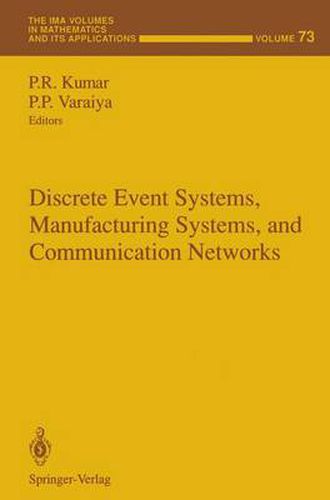Readings Newsletter
Become a Readings Member to make your shopping experience even easier.
Sign in or sign up for free!
You’re not far away from qualifying for FREE standard shipping within Australia
You’ve qualified for FREE standard shipping within Australia
The cart is loading…






This title is printed to order. This book may have been self-published. If so, we cannot guarantee the quality of the content. In the main most books will have gone through the editing process however some may not. We therefore suggest that you be aware of this before ordering this book. If in doubt check either the author or publisher’s details as we are unable to accept any returns unless they are faulty. Please contact us if you have any questions.
This IMA Volume in Mathematics and its Applications DISCRETE EVENT SYSTEMS, MANUFACTURING SYSTEMS AND COMMUNICATION NETWORKS is based on the proceedings of a workshop that was an integral part of the 1992-93 IMA program on Control Theory.
The study of discrete event dynamical systems (DEDS) has become rapidly popular among researchers in systems and control, in communication networks, in manufacturing, and in distributed computing. This development has created problems for re searchers and potential consumers of the research. The first problem is the veritable Babel of languages, formalisms, and approaches, which makes it very difficult to determine the commonalities and distinctions among the competing schools of approaches. The second, related, problem arises from the different traditions, paradigms, values, and experience that scholars bring to their study of DEDS, depending on whether they come from control, com munication, computer science, or mathematical logic. As a result, intellectual exchange among scholars becomes compromised by unexplicated assumptions. The purpose of the Workshop was to promote exchange among scholars representing some of the major schools of thought in DEDS with the hope that (1) greater clarity will be achieved thereby, and (2) cross-fertilization will lead to more fruitful questions. We thank P. R. Kumar and P. P. Varaiya for organizing the workshop and editing the proceedings. We also take this opportunity to thank the National Science Foundation and the Army Research Office, whose financial support made the workshop possible. A vner Friedman Willard Miller, Jr.
$9.00 standard shipping within Australia
FREE standard shipping within Australia for orders over $100.00
Express & International shipping calculated at checkout
This title is printed to order. This book may have been self-published. If so, we cannot guarantee the quality of the content. In the main most books will have gone through the editing process however some may not. We therefore suggest that you be aware of this before ordering this book. If in doubt check either the author or publisher’s details as we are unable to accept any returns unless they are faulty. Please contact us if you have any questions.
This IMA Volume in Mathematics and its Applications DISCRETE EVENT SYSTEMS, MANUFACTURING SYSTEMS AND COMMUNICATION NETWORKS is based on the proceedings of a workshop that was an integral part of the 1992-93 IMA program on Control Theory.
The study of discrete event dynamical systems (DEDS) has become rapidly popular among researchers in systems and control, in communication networks, in manufacturing, and in distributed computing. This development has created problems for re searchers and potential consumers of the research. The first problem is the veritable Babel of languages, formalisms, and approaches, which makes it very difficult to determine the commonalities and distinctions among the competing schools of approaches. The second, related, problem arises from the different traditions, paradigms, values, and experience that scholars bring to their study of DEDS, depending on whether they come from control, com munication, computer science, or mathematical logic. As a result, intellectual exchange among scholars becomes compromised by unexplicated assumptions. The purpose of the Workshop was to promote exchange among scholars representing some of the major schools of thought in DEDS with the hope that (1) greater clarity will be achieved thereby, and (2) cross-fertilization will lead to more fruitful questions. We thank P. R. Kumar and P. P. Varaiya for organizing the workshop and editing the proceedings. We also take this opportunity to thank the National Science Foundation and the Army Research Office, whose financial support made the workshop possible. A vner Friedman Willard Miller, Jr.